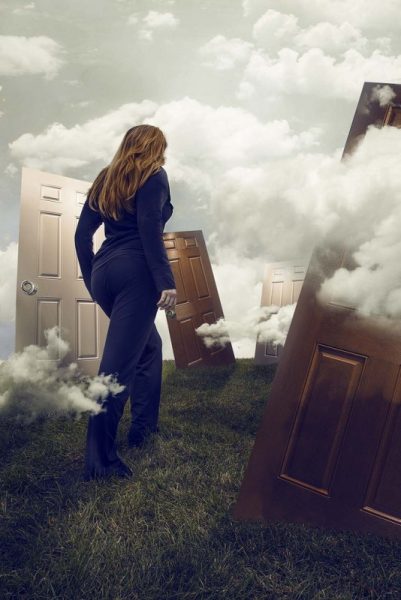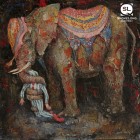My first question begins with an observation. What struck me (and exhilarated me) as I was reading was the way the story actually feels like the slow, ominous rise of flood waters. How did you come up with the story’s premise and form?
I think this story had been inside me for a long time, so that by the time I got to writing it, it was already whole. I wrote it in a sort of frenzy, oddly enough while I was at work at my old 9-to-5 job. I used to sit at my desk for hours wishing I wasn’t in that room—a stout, pale green square drifting inside a brick building anchored in Tallahassee. I’d often write during the dull hours. Writing this piece was a sort of rescue mission. I mean that in the sense that both the story itself is a rescue mission, but also that I was rescuing the story from my subconscious while I wrote it. After I finished writing it, I felt like something had happened. I love that feeling, but it doesn’t happen as much as I’d like. Beyond that I didn’t think about the arrangement of the piece or its progression. The story must have formed itself or, because I write almost every day, it had simply found a way to escape my brain whole like a jellyfish washed up on shore. I also naturally write using a lot of water imagery. My childhood was a kind of flood. Growing up was a kind of being washed over, a sort of being covered up and not knowing how to resist the forces around me. I think that feeling is very present in the story. Maybe other people can relate to that sense of having been whole as a child and having to deal with or handle other peoples’ un-wholeness but without having the proper equipment.
You mentioned that this story was written while you were working a 9-5. Is there something about that atmosphere that actually triggered your creativity and your need to tell stories?
It was probably a build up of angst that triggered a lot of writing in that office. I don’t do well with too much structure in my days. I start thinking up ways to escape the inevitable pattern of the 9-to-5 life and yell “Fucking idiot!” a lot while commuting. Also, the job itself was not creatively stimulating—I was writing e-learning courses for pharmaceutical drug companies and insurance associations for a huge multinational company that shall remain nameless. To keep my sanity I’d either go for a walk every day or open a Word document and start typing. That’s the thing about a 9-to-5 existence, you find yourself in front of a keyboard for hours. In that way it probably helped me produce more raw writing than I do now in academia. Most of those documents I deleted because I was paranoid about leaving any trace of my delinquency as an employee, but some survived.
The shift in the final paragraph of the piece was such a thrilling little jump. What led you to that ending?
I guess the movement of the piece, its timeline, though really sped up, relates to being a child and then suddenly leaving for college and that release, that generous amount of freedom that brings its own kind of isolation. I had been part of a system, and then the system broke down and I was alone. I was surprised myself by the ending, most of all that it was there as I finished writing the piece, and when I reached out to grasp for a way out of the story something was handed to me.
And the “you” character in that final paragraph?
Actually, what I like about the ending is that I don’t know who the “you” is. I am still not sure if it is the mother character or the childhood of the narrator character. I think the ambiguity (though often a pitfall) serves the piece well since everything, when underwater, looks ambiguous.
This story delivers one of my all-time favorite flash fiction “fart scenes.” So I have to ask: what would you consider your favorite fart scene?
This is such a funny question! Thank you for it. Actually, I am seriously unversed in the world of literary farts (not the old writer types, of those I know a few). I went so far as to Google literary farts (an exercise I’d recommend) and then thinking about famous movie farts (I’d not recommend Googling that) because I’ve always remembered the scene in the film Fanny and Alexander when an uncle puts out a candle with a fart to entertain his nieces and nephews, which also reminds me of my uncle who used to drink milk through his nose. So, I’ve settled on simply saying that anyone who has a brother, especially an older brother, knows what an effective weapon farting can be. My brother was a black-belt, world-class terrorizer in this capacity. My younger sister bore the brunt of it, I think, since she was the smallest. Embarrassingly and possibly in reaction to my brother, I didn’t fart until, I think, well after the age of thirty when I told my brother-in-law that if I held a fart long enough it would come out as a burp. He laughed at me for years about this. However, more recently, when Mary Roach published Gulp: Adventures on the Alimentary Canal, I found out that I had been right all along! Exoneration! Also, my brother really did fart behind the dining room drapes one night at dinner because our father had asked him to excuse himself if he was going to continue farting at the table. I guess, to him, excusing himself meant standing behind the drapes. I’m pretty sure he doesn’t do this anymore and will deny this story, but it was too memorable not to find its way onto the page.



 The SmokeLong Grand Micro Contest (The Mikey) is now an annual competition celebrating and compensating the best micro fiction and nonfiction online.
The SmokeLong Grand Micro Contest (The Mikey) is now an annual competition celebrating and compensating the best micro fiction and nonfiction online.